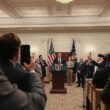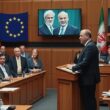New German Study Finds No Radical Content in Mosque Sermons, Highlights Positive Messages
A recent study conducted by the Friedrich-Alexander-University of Erlangen-Nürnberg (FAU) has found no evidence of radical content in German mosque sermons, instead revealing a focus on everyday practical and ethical themes.
Researchers from the “Wechselwirkungen” project analyzed Friday sermons from the three major Muslim associations in Germany, representing around 1,500 mosques and found that the content was overwhelmingly concerned with moral exhortations that could be endorsed by non-Muslims as well.
Dr. Jörn Thielmann, an Islamic studies expert, noted that the sermons often dealt with general moral advice, stressing the importance of education, family, neighborhood and social engagement. The study found no hate speech and extremism and violence were explicitly rejected in the sermons.
The study also highlights the disparity between the positive messages of the mosques and the lack of attention they receive in the public sphere. Thielmann criticized the fact that the Muslim associations’ calls for social engagement and ethical positions are largely ignored by the media and politics, despite being based on a thorough analysis of sermons from 2005 to 2024.
The findings of the study suggest that the media and political landscape in Germany may be missing an opportunity to engage with the positive values and messages promoted by the Muslim community and instead perpetuating a negative stereotype of Islam and Muslims in Germany.





